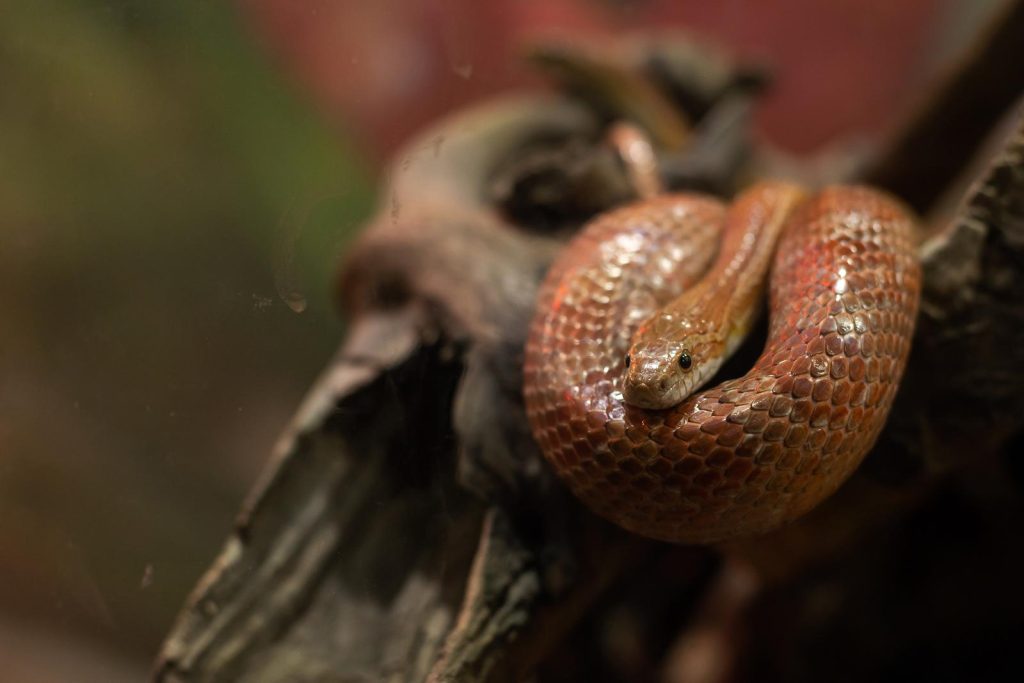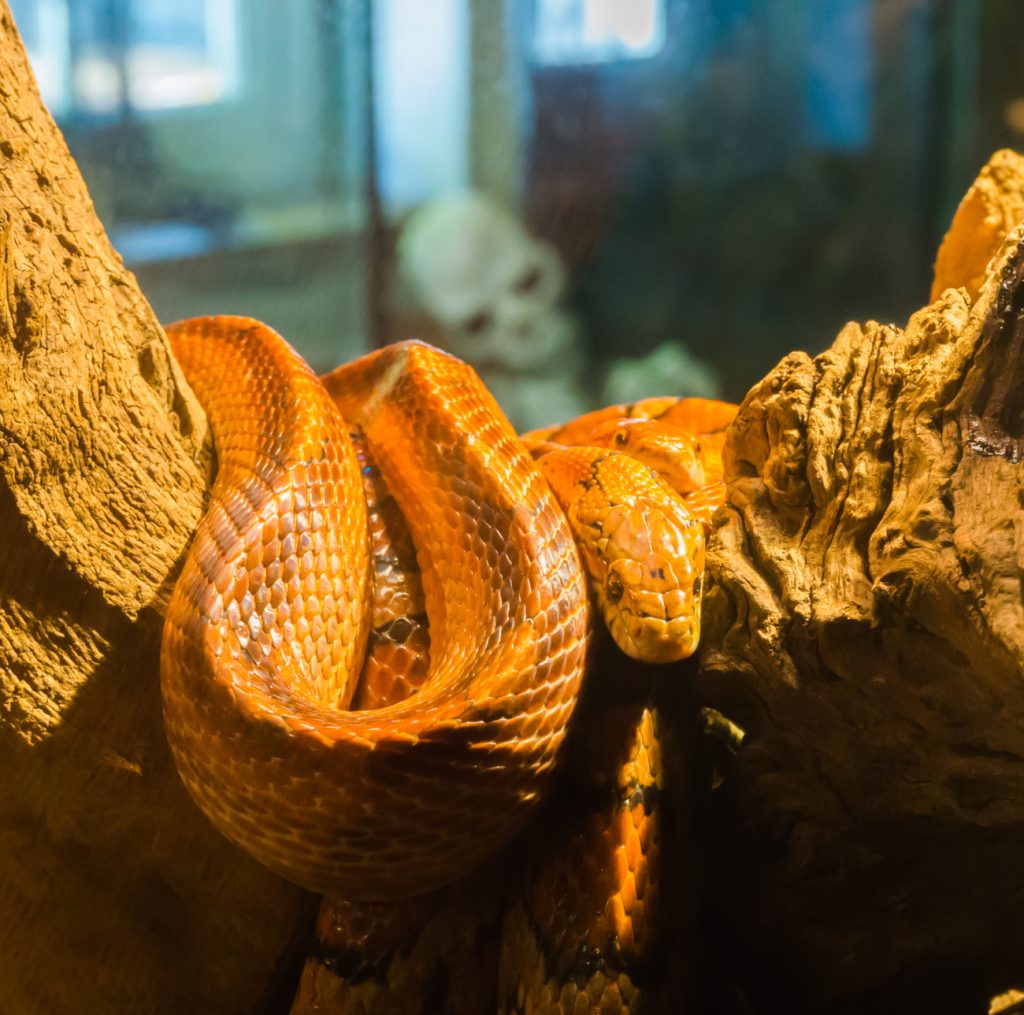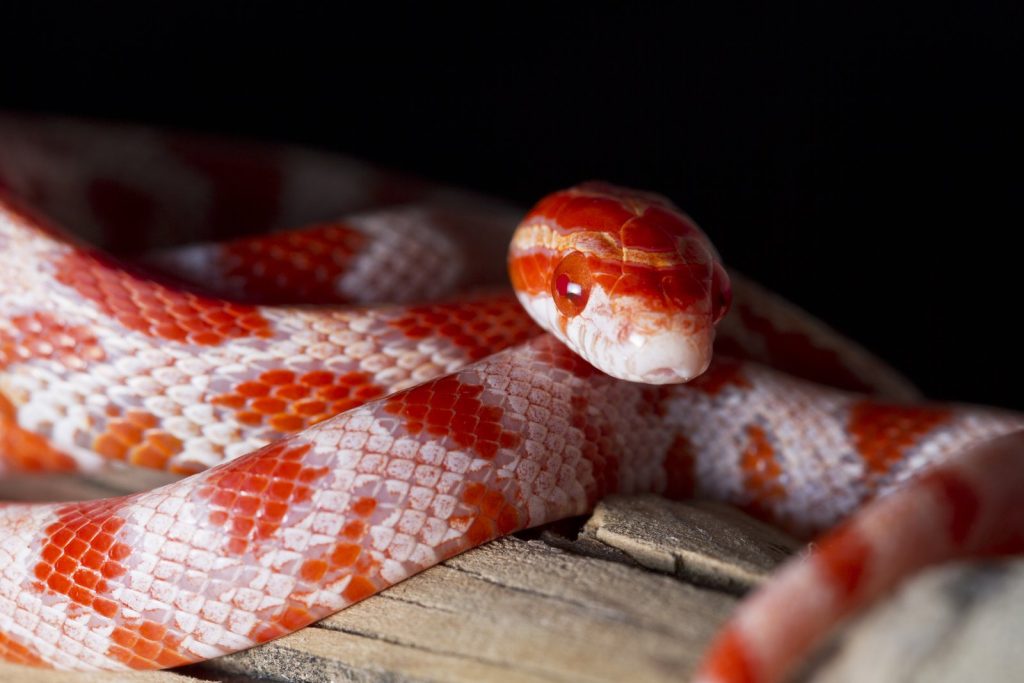Corn snakes – also known as Red Rat Snakes, are a popular pet in the home, yet one concern about potential bites.
Typically docile & friendly when kept as captives, corn snakes rarely bite their owners; but even if they do, it’s no cause for concern – these non-venomous creatures pose zero danger!
Knowing what forces your snake’s biting behavior is essential for managing it in the future. There are a few key reasons why your snake may bite you, including:
- Shedding Stress
- When hungry
- Sudden movement
- Poor handling technique
- Overhandling
- Unfamiliar environment
- Health issues
- Stress from other sources (loud noises, insufficient hides, temperature fluctuations, etc.)
In this article, we will dive into the seriousness of a corn snake bite, what could provoke it, and how to handle the wound and curb such behavior in the future.
Do Corn Snakes Bite?
Although it is rare, domesticated corn snakes can bite you – after all, like any other species in the wild, they are predatory.
Rodents and mice make up the majority of their diet, so when a snake feeds on its prey, it latches onto them with constricting body coils before swallowing them whole.
That said, accidental bites occasionally happen as these animals possess weak eyesight – that sometimes mistakes your finger for food or even defend itself if feeling threatened or agitated.
As long as you are cautious and give your snake the proper care to remain healthy, bites should be a rare thing of concern with corn snakes – known for their docile temperaments.
Is the Corn Snake Venomous?
The Serpentes order is home to many venomous species – some of which are feared due to their ability to cause deadly harm with just a single bite.
Fortunately, corn snakes don’t fall into this category. In fact, these creatures rely solely on constriction instead of toxins in their natural habitat – suffocating small animals before devouring them instead of relying on toxin-infused bites!
This means that when it comes down to survival instincts and physiology – corn snakes have no use for venom whatsoever!
What Happens if a Corn Snake Bites You?
As I’ve already mentioned that corn snakes are non-venomous, however, they’re mild-mannered constrictors. With tiny teeth resembling fish bones that can be sharp at times, they have ~20 – 30 small teeth (recurved) which assist in latching onto prey; a corn snake’s bite is simply nothing more than a gentle scratch!
The level of discomfort you may experience is contingent on where it was bitten and if it’s an adult or juvenile snake.
- If a hatchling bites you, its tiny teeth likely won’t be able to penetrate through your tough skin & you may experience some minor discomfort – but it will subside quickly.
- A corn snake’s bite can be more piercing as an adult due to its increased size and formidable teeth & you may even spot some tiny bloodstains – where the teeth break through your skin.
In addition to physical pain, some people experience psychological distress – when bitten by a snake (regardless of its size & venomous nature).
Is a Corn Snake’s Bite Dangerous?
Corn snake bites are not particularly dangerous; however, their mouths contain – bacteria & germs.
All reptiles (including corn snakes) carry Salmonella on their skin as well as other harmful microorganisms.
Consequently, I advise you to disinfect any broken skin properly if you do experience a bite from your pet corn snake.
Why Did My Corn Snake Bite Me?
While a bite from a corn snake is usually harmless – it’s still important to understand the potential causes to ensure it doesn’t happen again.
Here I’ve enlisted some of the common reasons a corn snake might bite.
Reason 1: Sudden Movement
Corn snakes can be startled by sudden movement and react defensively. If you are handling your snake & move too quickly – it may bite as a reflex to protect itself.
Moving slowly & deliberately will help prevent this from happening.
Reason 2: Shedding Stress
Shedding is an important and natural process for snakes – however, it’s stressful.
During the shedding cycle, a snake’s skin may become tight & uncomfortable – making them more prone to protect itself by biting you.
Reason 3: Stress From Other Sources
External factors can also make your pet stressed such as:
- Loud noises;
- Insufficient hides;
- Temperature fluctuations, etc.
The presence of any of these elements when you’re handling your snake –may make your pet agitated & it may bite you as a defensive mechanism.
Reason 4: When Your Pet Is Hungry
To be in good shape and stay healthy & happy your corn snake needs to eat frequently, however, if he/she last fed a long while ago – it may become hungry & bite.
Reason 5: Poor Handling Technique
Another common cause of corn snake bites is improper handling technique – if you are not handling your snake correctly & cautiously, it may become upset & bite to protect itself.
Reason 6: Overhandling
Corn snakes can become overwhelmed by too much handling. If your corn snake is frequently handled, it may eventually start displaying signs of aggression (when you approach them) – such as:
- Biting
- Hissing
- Coiling into ‘S’ shape
- Tail rattling
Reason 7: Unfamiliar Environment
When you take your corn snake out of its usual environment or handle it in an unfamiliar location – it may become stressed or scared & bite as a result.
Whenever possible, try to keep the handling of your snake to familiar locations.
Reason 8: Health Issues
Lastly, health issues can be a cause of corn snake bites. If there is something wrong with your snake, it may become defensive & bite as a result.
Take them to the vet if you suspect they are unwell, & watch for any signs of:
- Illness
- Distress
- Change in behavior
What to Do in the Event of a Corn Snake Bite?
In the unfortunate event that a corn snake bites you, how should you best react?
Here I’ve described the measures you can take to ensure the safety of your pet and yourself:
Step 1: Remain Calm & Stay Still
Don’t let panic take over if your corn snake bites you, as they are non-venomous. The essential part is to stay calm since it’s likely that the situation has made them:
- Confused
- Excited &
- Slightly aggressive
Even if their bite was accidental – a negative reaction could worsen the problem & further stress out your pet.
Of course, being startled by the bite is natural enough but don’t respond with any overly dramatic reactions such as:
- Making sudden movements
- Throwing away your corn snake in fear
This will only make things worse😟!
Step 2: Be Gentle
After a bite, constriction is an instinctual response for corn snakes. As your snake starts to wrap around your arm – be gentle while you carefully unwind it.
Your main priority should always be helping the snake return safely & swiftly back into its natural environment.
Step 3: Detach the Snake
One of the most detrimental consequences that can result from a pet corn snake bite is latching.
Never try to forcibly remove the snake if it latches onto you! If you do so then:
- The snake’s backward-facing teeth will sink deep into your skin & may possibly rip through as you try to remove it – resulting in a more severe wound.
- Tugging harshly on the snake could cause it to tighten its grip & lead to stress-related illnesses.
To detach the snake’s latching you can use one of the following measures:
- Drip some icy cold water onto your corn snake’s head & latched area – this sudden shift in temperature will usually surprise them & prompt removal.
- For an even more effective result, you can also use high-percentage spirits (such as vodka or whiskey) instead of rubbing alcohol.
- An alternative way to do this is by utilizing tweezers or a pencil to delicately open the snake’s mouth.
Step 4: Give Your Snake Space
After a bite, leave your pet alone to unwind in its enclosure & avoid handling just yet if you were tending the tank or feeding them when it happened.
Instead, provide some space for the snake to calm down before resuming those tasks.

Even if your corn snake bite is not severe, taking proper care of the wound is crucial, as you never know what bacteria or dirt may enter.
To provide precautionary measures against infection, here are some steps that I suggest to take in an adverse situation:
Step 1: Use Cold Water
To keep yourself safe from any bacterial or germ-related issues – wash the wound with water & use cold water instead of warm.
This can help prevent inflammation & swelling while bringing a sense of comfort against any burning sensation that may arise.
Step 2: Clean With an Antiseptic Soap
To disinfect the wound, reach for a bar of soap. Most corn snake bites are minor & tend to cause minimal pain – so an antiseptic soap with ingredients that can fight germs is your best bet – just make sure you get one with a mild formula so as not to overly irritate the area.
Cleanse thoroughly using this product, then rinse off all residue until it’s completely gone & dry off with a towel before proceeding further in treatment.
Step 3: Apply Alcohol
After cleaning the wound, take additional steps to ensure the corn snake bite mark stays sanitary.
A cotton swab soaked in medical alcohol with a content of ~70 percent should be applied to the site as this will remove any germs present and help heal it.
However, do not overdo this process since too much alcohol can:
- Dry out and damage the skin surrounding the wounded area
- Eliminate beneficial bacteria
- Hinder wound’s recovery
Step 4: Secure With a Bandage if Needed
You can secure a bandage to your wound to avoid the spread of germs and infection – but if it’s not severe in nature, avoid this step.
Additionally, most corn snake bites are relatively minor – hence medical tape will suffice for covering them up.
How To Prevent Bites in the Future
To uphold a healthy bond with your reptile companion preventing bites is key – so that their encounters don’t become a source of stress.
To help eradicate this biting conduct – here I have listed some key suggestions.
- Feed your scaly friend small mice after every 7-10 days (depending on their age) to prevent this nipping behavior. Try to adhere to the timeline – otherwise, the corn snakes will become restless and agitated.
- Before the feeding session, avoid unnecessary contact with your pet – as hunger sets in, they may mistake your hand for food!
- Abstain from handling your snake during the shedding period.
- Corn snakes are solitary creatures who greatly appreciate their peace & quiet. To ensure they remain stress-free & nonaggressive – provide them with an ideal habitat that promotes seclusion.
- Maintain consistent environmental conditions, offer your pet plenty of places to hide away, as well as clean the enclosure regularly.
- You must wash your hands thoroughly to get rid of any lingering food scent & particles before touching your buddy – this will guard you against being bitten – as the reptile may confuse you for its next meal.
- You’d handle your pet with proper technique – avoid grasping the snakes using your fingers; instead, allow them to crawl around by holding them gently in your palms.
- It is in your best favor to be quiet & calm when handling your reptile friend, as loud noises can disrupt its mood.
- Lastly, remember that an agitated reptile is never a good sign. If your snake looks restless & aggressive when you approach it – take some time away & give them the space to relax.
Final Thoughts
As I’ve mentioned, a corn snake’s bite won’t bring you much agony – however, it is still essential to recognize that your pet is trying to express something & should be respected as such.
In an adverse situation when your buddy bites you – carefully assess the circumstances & comprehend what message your reptile companion is trying to convey – then work towards rectifying it.
With patience & understanding, your relationship with your snake will continue to get better over time.
Do you have anything to add to it or ask about? Let us know in the comments below!





2 Comments
Hello 🙏 blessings. I have a question I have a snow corn snake and I don’t know how to know if it’s a boy or girl 7 months old
Hi John, great question! It can be tricky to tell a young corn snake’s sex without a bit of practice. There are a few ways to do it, but I find the safest and easiest method for a beginner is examining the tail shape. Male corn snakes tend to have longer, thicker tails that taper off gradually after the vent (their cloaca). Females, on the other hand, will have a shorter tail that tapers quickly after the vent.
If you’re still unsure, another way is to count the scales from the vent towards the tip of the tail. Males often have more than 140 scales (70 pairs), while females typically have 59 to 70 pairs.
For a thorough explanation, you can find our similar article on ball python sexing.
Please remember, the most accurate way to sex a snake is with a technique called probing, but this should only be done by a veterinarian or experienced reptile handler to avoid injuring your snake.